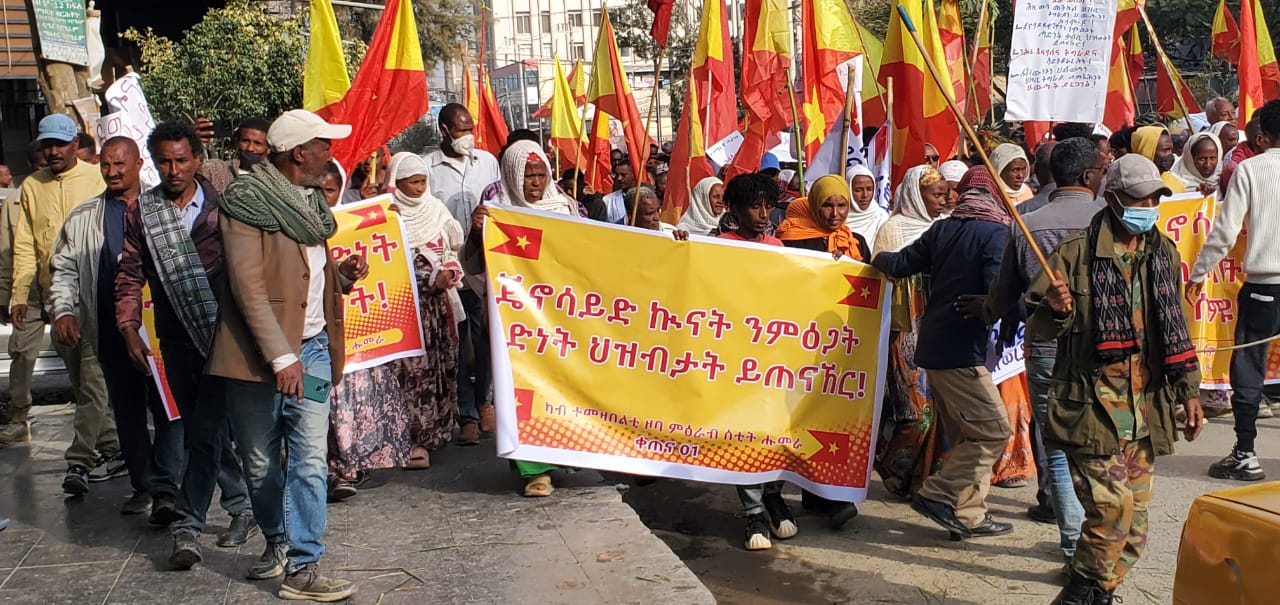By TESFA-ALEM TEKLE
A senior Ethiopian official has rejected U.S. President Donald Trump’s claims that the United States has financed the construction of the Grand Ethiopian Renaissance Dam (GERD), calling the remarks “false and destructive.”
Speaking earlier this week, Fikrte Tamir, deputy director of the GERD Coordination Office, dismissed Trump’s assertion that the controversial hydropower project was built “with United States money, largely.”
She emphasized that the massive infrastructure project—Africa’s largest hydroelectric plant—was funded entirely by Ethiopians, through government-led initiatives and grassroots public contributions.
“The dam was built without any foreign aid,” Ms. Fikrte said. “Regarding what Donald Trump claimed, the government should respond with far-sighted and carefully considered diplomatic procedures.”
The GERD, constructed on the Blue Nile in northern Ethiopia, has long been a source of national pride, symbolizing both technological ambition and self-reliance.
Launched in 2011, the project has taken over 14 years to complete and began generating electricity in 2022. It was officially finalized earlier this month.
Trump’s Comments Stir Controversy
Trump’s comments were made last week during a public appearance and echoed earlier claims he posted on his Social media platform in June, where he said the dam was “stupidly financed by the United States of America” and was “substantially reducing the water flowing into the Nile River.”
While Trump did not provide evidence to support his claims, his remarks quickly drew attention, particularly in Ethiopia, where the GERD remains a highly sensitive and politicized topic.
Many Ethiopians saw his statements as undermining the country’s sovereignty and the years of financial sacrifice made by citizens to bring the $4 billion project to completion.
The Ethiopian government has not yet issued an official response, but Ms. Fikrte’s comments appear to reflect the sentiment of many in the country’s leadership.
A Symbol of National Unity
From its inception, the GERD was touted as a people-powered project.
The Ethiopian government orchestrated an unprecedented national campaign to raise funds—selling bonds to local businesses, encouraging citizens to contribute from their wages, and rallying support from the Ethiopian diaspora. Even schoolchildren were involved in fundraising efforts.
In the past year alone, over 1.7 billion birr ($12.3 million) has been collected from the public, according to the GERD Coordination Office. Despite delays and budget overruns, the project has remained a unifying force in a country often divided by ethnic and political tensions.
Regional Tensions Persist
The GERD has been a major source of diplomatic friction between Ethiopia and its downstream neighbors, Egypt and Sudan. Both nations fear the dam could significantly reduce their share of Nile water—a lifeline for agriculture, drinking water, and industry.
Egypt, in particular, has long opposed the project, viewing it as an existential threat. The Trump administration openly sided with Egypt during negotiations, further straining U.S.-Ethiopia relations at the time. Trump even warned in 2020 that Egypt might “blow up” the dam if a solution was not found.
Negotiations between the three Nile Basin countries have remained largely deadlocked despite African Union mediation efforts.
Ethiopia has consistently maintained that the GERD will not harm downstream nations and is vital to its economic development, particularly as roughly 60% of Ethiopians still lack access to electricity.
Diplomatic Implications
While Ms. Fikrte’s remarks were measured, they underscore the potential diplomatic implications of Trump’s statement.
As a U.S. president and a current influential political figure, his words carry weight—especially in the context of regional geopolitics and Ethiopia’s ongoing effort to position itself as a sovereign power within Africa.
Some Ethiopians have questioned how informed the GERD Coordination Office truly is about any potential foreign funding, given its technically independent status.
However, no concrete evidence has emerged to contradict the long-standing official narrative that GERD was financed without external support.
With the dam now fully operational, Ethiopia is hoping to shift focus from funding debates to energy production and regional cooperation. But as this latest controversy shows, GERD remains as politically charged as ever—both within Ethiopia and beyond its borders.



